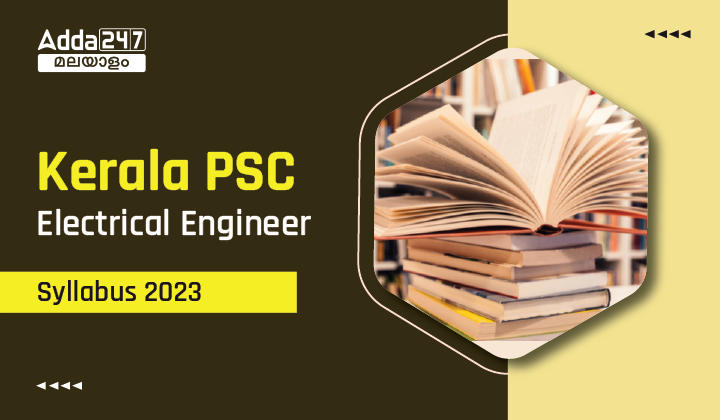Table of Contents
Kerala PSC Electrical Engineer Syllabus 2023: Kerala Public Service Commission has published Kerala PSC Electrical Engineer Syllabus. If you have applied for the post of Electrical Engineer and would like to know the detailed syllabus, then your search ends right here. In this article we will provide the detailed syllabus of the upcoming Kerala PSC Electrical Engineer Exam 2023. In order to crack the exam, one needs to have a clear understanding of the syllabus, therefore read through Kerala PSC Electrical Engineer Syllabus to broaden your perspective. You can also download Electrical Engineer PSC Syllabus in pdf format.
Kerala PSC Electrical Engineer Syllabus 2023
Kerala PSC Electrical Engineer Syllabus 2023: പരീക്ഷയ്ക്കുള്ള തയ്യാറെടുപ്പുകൾ ആരംഭിക്കാൻ സമയമായി. പരീക്ഷയിൽ വിജയിക്കുന്നതിന്, സിലബസിനെക്കുറിച്ച് വ്യക്തമായ ധാരണ ഉണ്ടായിരിക്കണം, അതിനാൽ കേരള PSC ഇലക്ട്രിക്കൽ എഞ്ചിനീയർ സിലബസ് 2023 വിശദമായി വായിച്ച് മനസിലാക്കുക. നിങ്ങൾക്ക് Kerala PSC Electrical Engineer Syllabus 2023 Pdf രൂപത്തിൽ ഡൗൺലോഡ് ചെയ്യാവുന്നതാണ്.
Kerala PSC Electrical Engineer Syllabus 2023: Overview
ചുവടെ നൽകിയിരിക്കുന്ന പട്ടികയിൽ Kerala PSC Electrical Engineer Syllabus 2023 സംബന്ധമായ എല്ലാ പ്രധാനപ്പെട്ട വിവരങ്ങളും ലഭിക്കും.
| Kerala PSC Electrical Engineer Syllabus 2023 | |
| Organization | Kerala Public Service Commission |
| Category | Exam Syllabus |
| Department | KERALA STATE COOPERATIVE COIR MARKETING FEDERATION LIMITED |
| Name of the Post | Electrical Engineer |
| Category No. | 053/2022 |
| Mode of Examination | ONLINE/ OMR |
| Medium of Questions | English |
| Total Marks | 100 |
| Duration of Examination | 1 Hour 30 Minutes |
| Official Website | www.keralapsc.gov.in |
Kerala PSC Electrical Engineer Exam Pattern 2023
കേരള പിഎസ്സി ഇലക്ട്രിക്കൽ എഞ്ചിനീയർ പരീക്ഷയുടെ വിശാലമായ മാതൃക ഇതാണ്:
- ഒബ്ജക്ടീവ് അടിസ്ഥാനത്തിലുള്ള പരീക്ഷയാണിത്.
- ആകെ 1.30 മണിക്കൂറാണ് പരീക്ഷാ ദൈർഘ്യം.
- ആകെ മാർക്ക് 100.
- ഓരോ ശരിയായ ഉത്തരത്തിനും 1 മാർക്ക് നൽകും.
- ഓരോ തെറ്റായ ഉത്തരത്തിനും 1/3 മാർക്ക് കുറയ്ക്കുന്നു.
| Electrical Engineer Exam Pattern 2023 | ||
| Modules | Topics | Marks |
| Module I | Electric Circuits | 10 Marks |
| Module II | Magnetic Circuits | 10 Marks |
| Module III | DC Generators | 10 Marks |
| Module IV | Digital Electronics | 10 Marks |
| Module V | Power Systems | 10 Marks |
| Module VI | Control Systems | 10 Marks |
| Module VII | Power Electronics | 10 Marks |
| Module VIII | Measurements and Instrumentation | 10 Marks |
| Module IX | Signals and Systems | 10 Marks |
| Module X | Transducers | 10 Marks |
Kerala PSC Electrical Engineer Syllabus: Download PDF
Kerala PSC Electrical Engineer Syllabus PDF ഡൗൺലോഡ് ചെയ്യാൻ, താഴെ നൽകിയിരിക്കുന്ന ലിങ്കിൽ ക്ലിക്ക് ചെയ്യുക.
Kerala PSC Electrical Engineer Syllabus PDF Download
Kerala PSC Engineer (Electrical) Syllabus 2023 Detailed
Module I: Electric Circuits
- Kirchoff’s laws – maximum power transfer theorem. Star/delta transformation. Energy stored in a capacitor and inductor. Analysis of coupled circuits – dot polarity convention – sinusoidal steady state analysis of coupled circuits. Generation of alternating voltages and currents – rms value, average value, peak factor, form factor. AC through series R, L, C circuit – series resonance- resonant power – bandwidth. Resonance in parallel circuits.
Module II: Magnetic Circuits
- Absolute and relative permeability of a medium – Magnetic field strength- magnetic potential. Relation between magnetism and electricity – Series and parallel magnetic circuits with composite materials. Faraday’s laws of electromagnetic induction- Lenz’s law – statically and dynamically induced EMF.
Module III: DC Generators
- Constructional details, working principle – types of dc generators – emf equation – power stages – condition for maximum efficiency. DC motor – armature control and field control. Single phase transformer – working principle, equivalent circuit, losses in a transformer, condition for maximum efficiency. Three phase transformer – construction- difference between power transformer and distribution transformer. Alternators– constructional details –Synchronous motor – starting methods – synchronous condenser. Three phase induction motor – working principle, constructional details – slip, torque and current equations – torque- speed curve. Special Electrical Machines: Types and applications.
Module IV: Digital Electronics
- Number Systems and Codes: Binary, Octal and hexadecimal conversions- ASCII code, Excess -3 code, Gray code. Combinational circuits – Adders – Full adder and half adder. Multiplexers- De multiplexers. Flipflops – registers – counters. Digital – to – Analogue and Analogue-to-Digital conversion. Microprocessors – Internal architecture of 8085 microprocessor–Functional block diagram Instruction set – Addressing modes – Classification of instructions – Status flags. Machine cycles and T states – Fetch and execute cycles- Timing diagram.
Module V: Power Systems
- Line parameters -resistance- inductance and capacitance. Insulators –string efficiency – corona. Circuit breakers: rating, types. CTs – PTs – Relays – types. Per unit quantities- symmetrical components – symmetrical and unsymmetrical fault. Power system stability – steady state, dynamic and transient stability-power angle curve – Load Flow analysis – Gauss Siedal, Newton Raphson, Fast decoupled load flow
Module VI: Control Systems
- Transfer function of LTI systems – block diagram reduction – Signal flow graph – Mason’s gain formula – Type and Order of the systems- Characteristic equation Time domain specifications of transient and steady state responses- Impulse and Step responses of first order and second order systems. Static error coefficients of type 0,1,2 systems. Routh’s stability criterion. Frequency domain specifications. Polar plot and Bode plot – concepts of gain margin and phase margin- stability analysis.
Module VII: Power Electronics
- SCR- Structure, Static characteristics. Fully controlled and half controlled bridge rectifier with R, RL and RLE loads. Voltage Source Inverters– 1-phase half-bridge & full bridge inverter with R and RL loads – Three phase inverter – Pulse width modulation. Single quadrant, Two quadrant and Four quadrant chopper. Operational Amplifiers – fundamental differential amplifier- Modes of operation. Properties of ideal and practical Op-amp – gain, CMRR and slew rate.
Module VIII: Measurements and Instrumentation
- Measurement standards – errors – Types of Errors. Classification of instruments, secondary instruments–indicating, integrating and recording. Ammeters and voltmeters – moving coil, moving iron. Measurement of power: Dynamometer type wattmeter –Construction and working – Three phase power measurement – single wattmeter and two wattmeter methods. Measurement of energy – Single phase energy meter – construction and working. Digital Energy meters -Time of Day(TOD) meters. Oscilloscopes- principle of operation of general purpose CRO-basics of vertical and horizontal deflection system.
Module IX: Signals and Systems
- Classification of signals – Elementary signals- Basic operations on continuous time and discrete time signals. Concept of systems – Classification of systems- Properties of systems – Time invariance- Linearity -Causality – Memory – Stability. Sampling process – Impulse train sampling – sampling theorem- Aliasing effect. Zero order and First order hold circuits.
Module X: Transducers
- General classification- LVDT- angular displacement transducers- hall effect transducers. Batteries – Primary cells– secondary cells- battery ratings- grouping of cells. Wiring – systems of wiring- rules for domestic wiring. Earthing- types of earthing – rules for earthing. Illumination – Laws of illumination. Electric lamps – different types.




